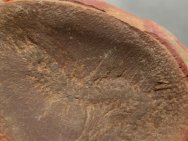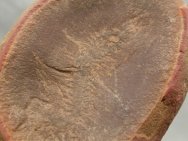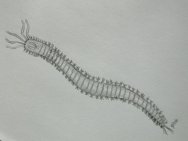Name: Esconites
zelus
Phylum: Annelida;
Class Polychaeta; Order Euicida, Family Eunicidae
Geological
Time: Pennsylvanian (~300 m.y.a.)
Size (25.4mm=1
inch): 41 mm long on a 47 mm by 62 mm nodule
Fossil
Site: Mazon Creek, Pit 11, Francis Creek shale, Braidwood, Illinois
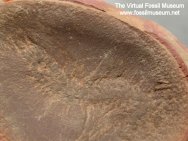 The
Polychaeta (Bristleworms) have a diverse representation among Mazon
Creek specimens. The segmented bodies of the Polychaeta have paired
lobes called parapodia which have a function in locomotion or respiration.
The parapodia bear numerous The
Polychaeta (Bristleworms) have a diverse representation among Mazon
Creek specimens. The segmented bodies of the Polychaeta have paired
lobes called parapodia which have a function in locomotion or respiration.
The parapodia bear numerous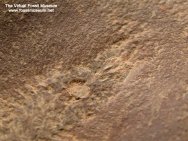 bristles which are the source of the name of the class (Polychaeta
means many bristles). This one is sure to have been a predatory
species, as are many modern-day bristleworms, due to the fact that
it possesses a formidable pair of jaws which were mounted in an
evertible proboscis. Note the jaws readily displayed in the close
up photo. They are often the best-preserved features of the animal.
The genus derives its name from ESCONI, an acronym for Earth Science
Club Of Northern Illinois.
bristles which are the source of the name of the class (Polychaeta
means many bristles). This one is sure to have been a predatory
species, as are many modern-day bristleworms, due to the fact that
it possesses a formidable pair of jaws which were mounted in an
evertible proboscis. Note the jaws readily displayed in the close
up photo. They are often the best-preserved features of the animal.
The genus derives its name from ESCONI, an acronym for Earth Science
Club Of Northern Illinois.
|
|



